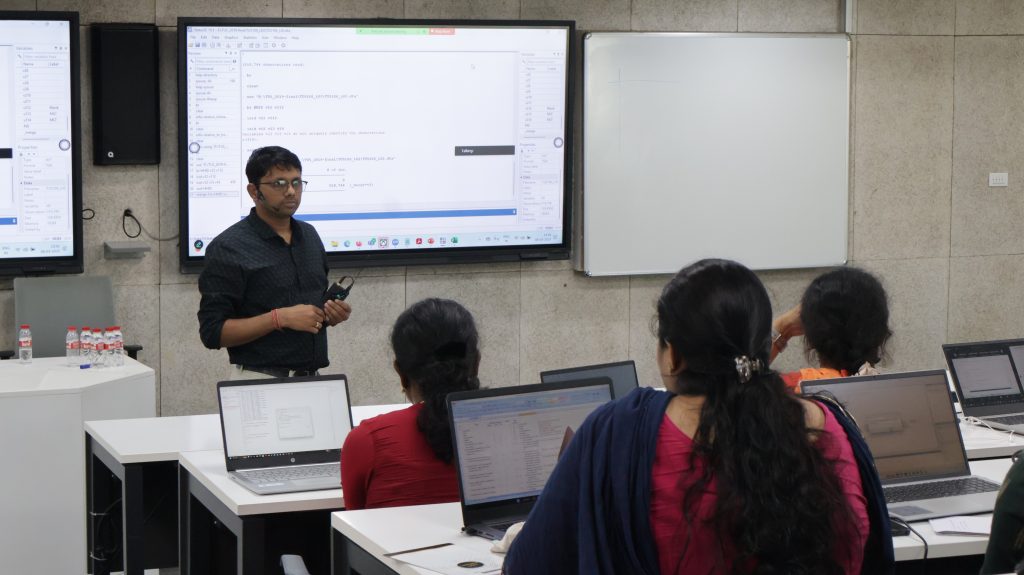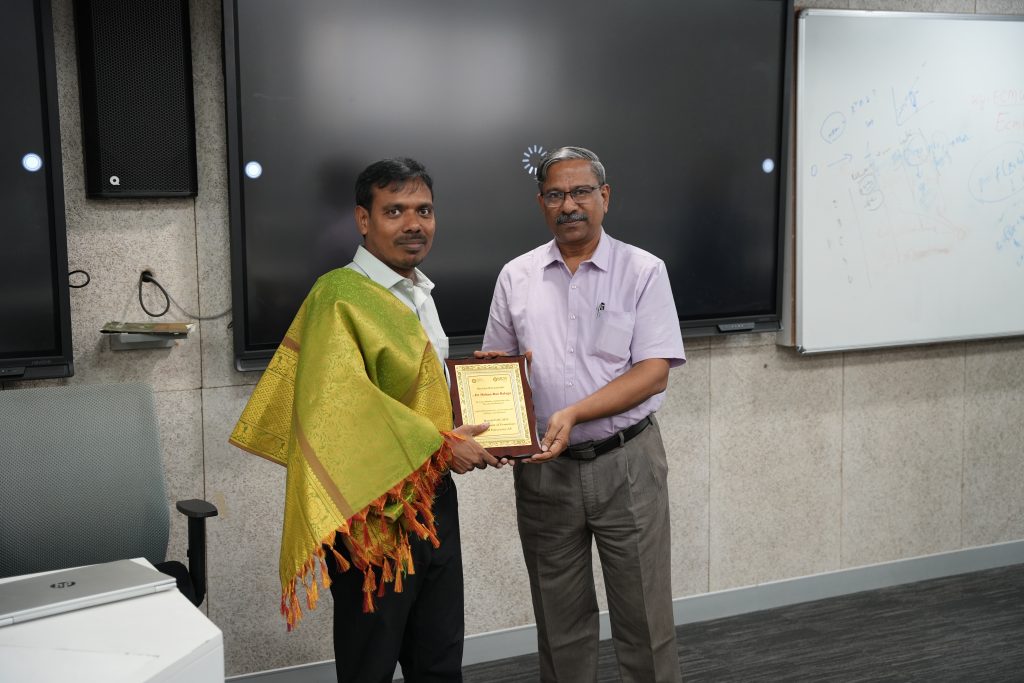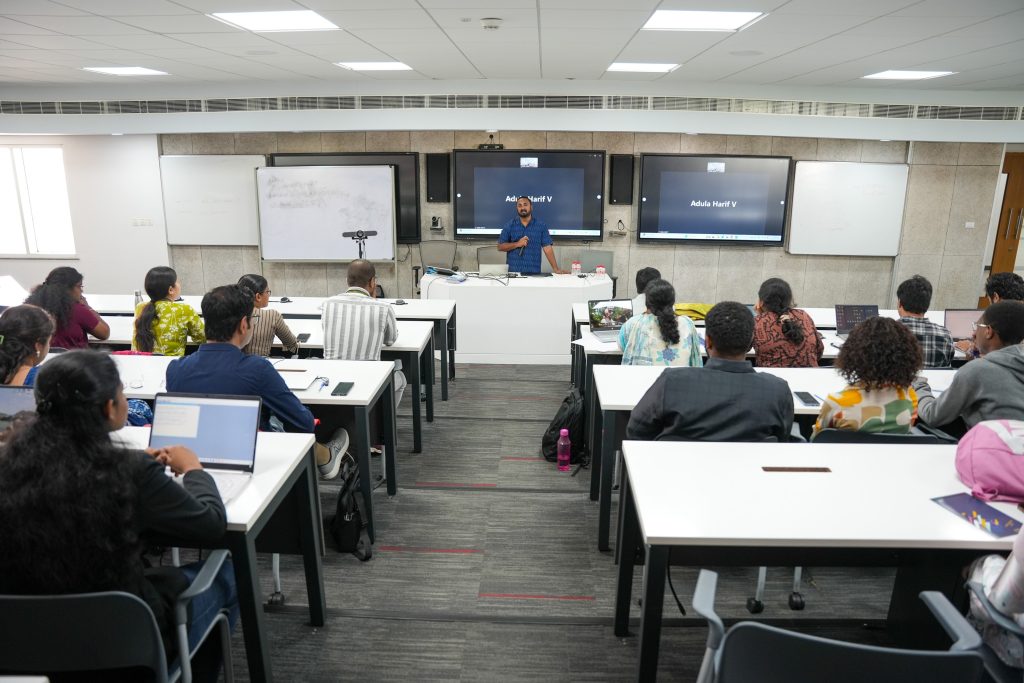Two-Day Workshop on Applied Econometrics & Its Applications in STATA and R
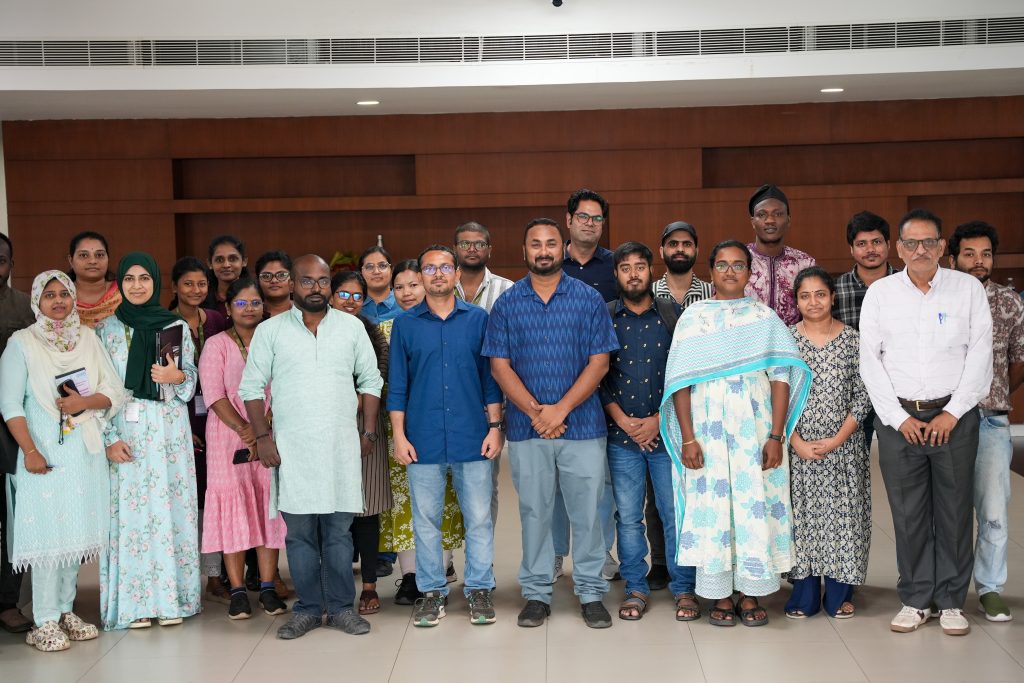
The Department of Economics at Easwari School of Liberal Arts successfully organised a two-day workshop titled “Applied Econometrics: Leveraging with Software and Databases” on March 7 – 8, 2025. The workshop witnessed the participation of approximately 40 attendees, comprising academicians, research scholars, and students from various institutions, including SRM IST, VIT-AP and Amrita University. The significant turnout reflected the keen interest in applied econometrics and the practical implementation of statistical software (R and STATA) for economic analysis.
The primary objective of the workshop was to provide a comprehensive understanding of econometric principles while emphasising hands-on training with statistical software such as STATA and R. Participants received practical exposure to key econometric techniques, including time series modelling, cross-sectional data analysis, and panel data estimation, thereby enhancing their empirical research capabilities.
The workshop featured four insightful sessions conducted by distinguished experts in the field of econometrics:
- Dr Anandarao Suvvari (IIT Goa) – Delivered an in-depth session on fundamental econometric techniques and their applications in STATA and R.
- Dr Mohan Rao Balaga (IIT Dharwad) – Provided a comprehensive analysis of time series methodologies, covering ARIMA, VECM, VAR, and ARDL models using macroeconomic and financial datasets.
- Dr Pratap C Mohanty (IIT Roorkee) – Delivered a session on cross-sectional data techniques, encompassing linear and non-linear models, instrumental variable (IV) estimation, and applications utilizing NSSO and large-scale survey data.
- Dr Vineesh Prakash (SRM University-AP) – Conducted an extensive session on panel data models, discussing Fixed Effects (FE), Random Effects (RE), Generalized Method of Moments (GMM), and dynamic panel models using CMIE ProwessIQ data.
The interactive nature of the sessions enabled participants to engage with the resource persons, deliberate on real-world econometric applications, and undertake practical case studies utilizing empirical datasets. The rigorous discussions and hands-on exercises significantly contributed to a deeper understanding of applied econometrics.
This two-day workshop proved an enriching academic initiative, equipping participants with essential econometric skills and strengthening their analytical capabilities in economic and financial data analysis. The positive feedback from attendees underscored the effectiveness of the workshop particularly in integrating theoretical knowledge with hands-on implementation.
- Published in Departmental News, Economics Current Happenings, Economics News, News
A Panel Discussion on Decoding the Budget 2025-26

The Department of Economics at Easwari School of Liberal Arts organised a panel discussion titled “Decoding the Budget: Insights, Perspectives, and the Big Picture” on February 03, 2025. The event was designed to provide in-depth insights into the Union Budget 2025-26, focusing on fiscal priorities, economic implications, and sectoral impacts. The discussion brought together distinguished experts from academia and policymaking to analyse key announcements and their long-term effects.
The panel discussion featured three esteemed panellists:
– Prof. Vinish Kathuria (Director, Institute of Development Studies, Jaipur & IIT Bombay) – Expertise: Productivity Measurement, Economics of Regulation, and Environmental Economics.
– Prof. D K Nauriyal (Professor, Department of Humanities and Social Sciences, IIT Roorkee) – Expertise: International Trade, Development Economics, and Economics of Intellectual Property.
– Dr Sujit Kumar (Chief Economist, National Bank for Financing Infrastructure and Development – NaBFID) – Expertise: Banking & Finance, Infrastructure, and the Indian Economy.
The experts analysed the macroeconomic factors influencing the budget, such as inflation control, fiscal deficit management, and global economic trends. The panellists discussed the implications of the budget on critical sectors, including infrastructure, banking, environmental sustainability, and trade policies. The discussion highlighted significant policy changes to boost economic growth and social welfare initiatives. The Q&A session allowed participants to seek clarifications and gain deeper insights into budget-related policies and their long-term effects.
Students, faculty, scholars, and individuals interested in economic policy and financial analysis participate in the discussion. Participants also joined online as the event was in the hybrid mode.
The panel discussion on Decoding the Budget 2025-26 successfully gave attendees a clearer understanding of India’s financial and economic direction. The expert insights helped bridge the gap between budgetary announcements and their practical implications. Students, faculty, and policymakers benefited from the interactive discourse, enhancing their knowledge of economic policies and fiscal governance.
This insightful session emphasised the importance of informed economic discussions in shaping perspectives on national financial policies and governance strategies.
- Published in Departmental News, Economics Current Happenings, Economics News, News
An Insightful Lecture on Student Migration

Prof. Irudaya Rajan, Founder Chair of the International Institute of Migration and Development and Distinguished Visiting Faculty at the Department of Economics, Easwari School of Liberal Arts, engaged with faculties, scholars and students on a compelling talk on “The Future of Student Migration” on November 22, 2024. Prof. Rajan delved into the crucial role of migration in shaping and redefining national demographics and offered valuable insights into internal and international migration trends, explaining their profound impact on labour markets, education systems, and policy-making. His talk sparked engaging debates and discussions, enriching the understanding of migration as a dynamic force in demographic change and national development.
During his visit, Prof. Rajan also interacted with faculty and students, discussing collaborative research projects and sharing his expertise. The session was a thought-provoking exploration of migration’s pivotal influence on global and local contexts, leaving the audience with much to reflect upon.
- Published in Departmental News, Economics Current Happenings, Economics News, News, Uncategorized
Scaling Heights: Nilesh Bags an Internship at RBI

The Department of Economics proudly announces that Mr Nilesh A, a third-year B.Sc. Economics (Hons.) student, has secured a highly coveted one-month research-based internship at the Reserve Bank of India, Mumbai. This internship is under the Department of Economic and Policy Research (DEPR).
“I am thrilled to share my experience of securing an internship at the Reserve Bank of India, a journey that was significantly supported by the resources and guidance provided by my university. I am grateful to all my professors at Easwari School of Liberal Arts at SRM University-AP for their unwavering support and encouragement. This internship is a pivotal step in my career, and I am excited about the future and eager to continue building on this incredible foundation,” stated Nilesh while expressing his gratitude for this once-in-a-lifetime opportunity.
Internships are remarkable opportunities to gain experience and exposure, build a strong network, and hone the skills you already possess. The Easwari School of Liberal Arts of SRM University-AP provides academic and research internships prioritising experiential and industry-based learning to help students cultivate a refined practical skillset.
India’s Tryst with Globalization: A Study on Growth and Poverty Nexus
The poor in India has continuous future benefits from globalization through improved healthcare – A new research from SRM University-AP economists
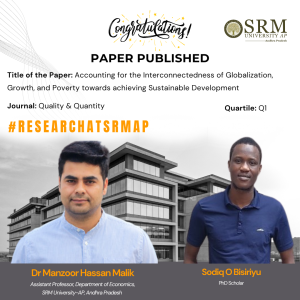 In a groundbreaking study, Dr. Manzoor H. Malik, an Assistant Professor in the Department of Economics, and Sodiq O. Bisiriyu, a Research Scholar, have developed a comprehensive framework known as the globalization-growth-poverty (GPP) triangular nexus.
In a groundbreaking study, Dr. Manzoor H. Malik, an Assistant Professor in the Department of Economics, and Sodiq O. Bisiriyu, a Research Scholar, have developed a comprehensive framework known as the globalization-growth-poverty (GPP) triangular nexus.
This innovative model examines the interplay between globalisation waves, economic growth trends, and their collective impact on poverty reduction in India, aligning with the nation’s commitment to achieving Goal 1 of the Sustainable Development Goals.
The researchers used three different indicators of poverty, encompassing the monetary and non-monetary constructs. The research controls for the impact of government development spending and domestic investment in the GPP nexus. The result of the research validates the significant globalization-led growth hypothesis in the short run and establishes the existence of the GPP triangular nexus in India. Additionally, the researchers found positive association of globalization and growth with monetary and non-monetary poverty measures in the short-run while the impact on monetary measure in the long-run is ambiguous.
Finally, the results offer significant insight into the impact of government development spending and domestic investment on poverty. The results prove that government development expenditure in India is detrimental to non-monetary poverty while domestic investment have insignificant impact on all poverty constructs.
From policy perspective, the researcher said, “the short-run validation of globalization-led growth hypothesis for India is challenging and calls for government broad-based framework to tackle impediments of long-term globalization-led growth and monetary poverty benefits”. They emphasized that only sustained long-term growth can accelerate the vision of India as stated in “Viksit Bharat 2047” agenda. Published in the esteemed ‘Quality & Quantity’ journal by Springer, with an impact factor of 2.87, this study provides valuable insights for academics, practitioners, and policymakers. It sheds light on the complex dynamics shaping contemporary socio-economic environments and offers evidence-based analysis supported by an extensive review of relevant literature.
- Published in Departmental News, Economics Current Happenings, News, Research News
Faculties Publish an Insightful Article on Political Manifestos and Labor Class
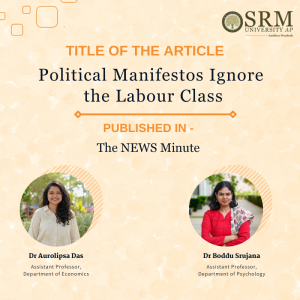 In a thought-provoking article titled “Political Manifestos Ignore the Labor Class,” Dr Aurolipsa Das and Dr Srujana Boddu, Assistant Professors from the Department of Economics, shed light on a critical issue that often goes unnoticed during election seasons. Their research delves into the disconnect between political promises and the ground realities faced by the labour class.
In a thought-provoking article titled “Political Manifestos Ignore the Labor Class,” Dr Aurolipsa Das and Dr Srujana Boddu, Assistant Professors from the Department of Economics, shed light on a critical issue that often goes unnoticed during election seasons. Their research delves into the disconnect between political promises and the ground realities faced by the labour class.
They critically examine the shortcomings of political manifestos, highlighting how they often overlook the interests and needs of the labour class. As India heads into another election cycle, Dr Aurolipsa Das and Dr. Srujana’s article serves as a wake-up call for policymakers. To bridge the gap between political promises and ground-level impact, evidence-based policies that prioritise the labor class are essential. It is time for political parties to move beyond rhetoric and take concrete steps toward meaningful progress.
Read the full article by clicking on this link to gain deeper insights into this crucial topic.
- Published in Departmental News, Economics Current Happenings, Economics News, News
Uncovering the Factors Influencing Income Inequality in Rural Indian Households: A Comprehensive Study
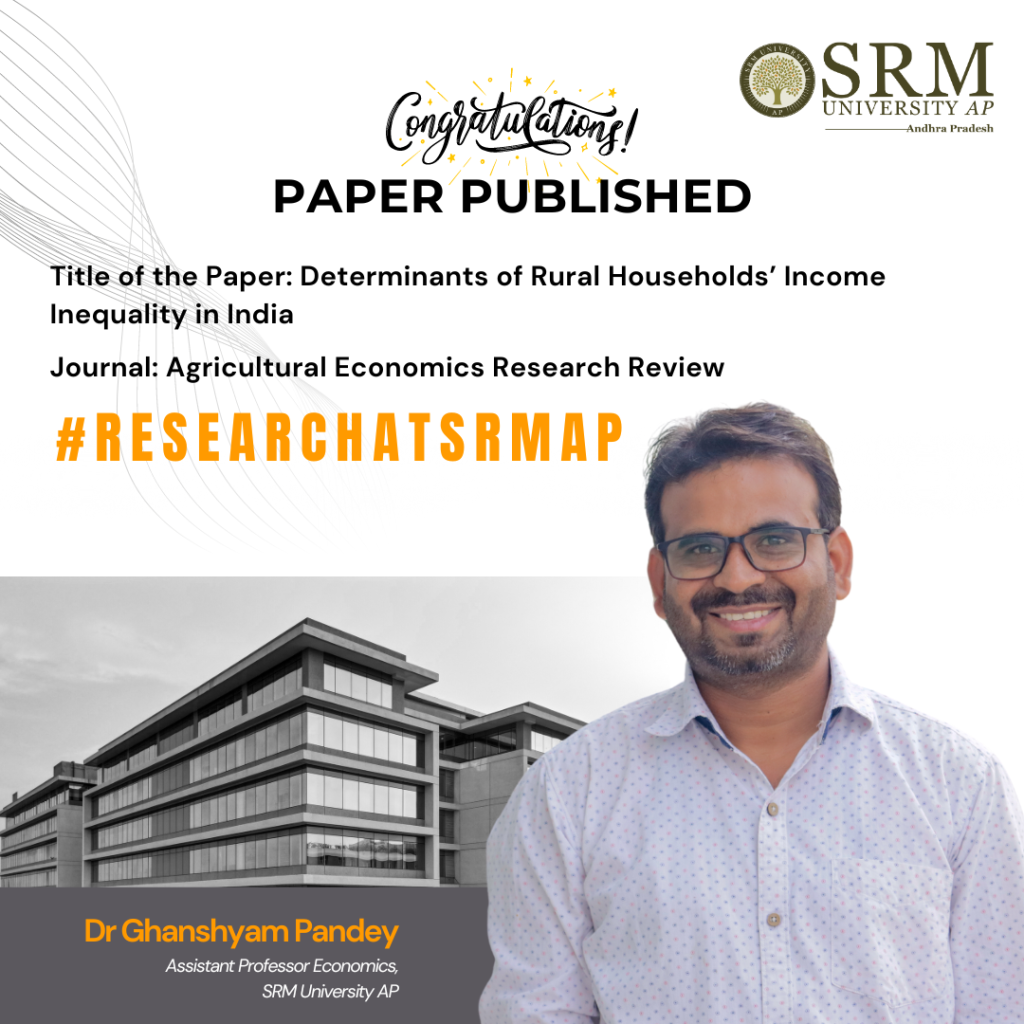
The Department of Economics takes immense pride in announcing the publication of the research paper, “Determinants of Rural Households’ Income Inequality in India” authored by Dr Ghanshyam Pandey, Assistant Professor. The paper has been published in the Journal of Agricultural Economics Research Review (ABDC-C), and has an impact factor of 0.19. Dr Pandey’s paper examines the factors that determine income inequality among rural farm households in India and discusses the implications of the findings for policymakers, practitioners, and researchers. The study highlights how addressing the identified factors could potentially reduce income inequality among rural farm households and improve the overall well-being of the rural population.
Abstract
This study has identified the drivers of income inequality in rural India using IHDS 2011–12 national-level survey. The inequality decomposition methodology developed by Fields (2003) based on a two-way regression methodology has been used. The study has modified the previous regression based inequality decomposition technique by accounting for diverse income sources and regimes as well as by effectively correcting for selectivity in the various income regimes. The CLAD model has been used to distinguish the determinants of income inequality in rural India. The study has indicated that income inequality in farm households can be attributed to the level of education, family size, caste/social group composition, and composition in land ownership and that family size and land ownership are instrumental primarily due to off-farm labour income. The study has shown that education is a significant factor in income inequality due to its impact on off-farm work income. The study has suggested that a continued increase in variability in land distribution may exacerbate income inequality in households in rural India.
Link to the Article
Pandey G and Devi B (2023). Determinants of rural households’ income inequality in India. (2024). Agricultural Economics Research Review, 36(2), 213-225. https://epubs.icar.org.in/index.php/AERR/article/view/150669

- Published in Departmental News, Economics Current Happenings, Economics News, News, Research News
Examining the Impact of Bifurcation on Agricultural Development in Jharkhand: A Comprehensive Study
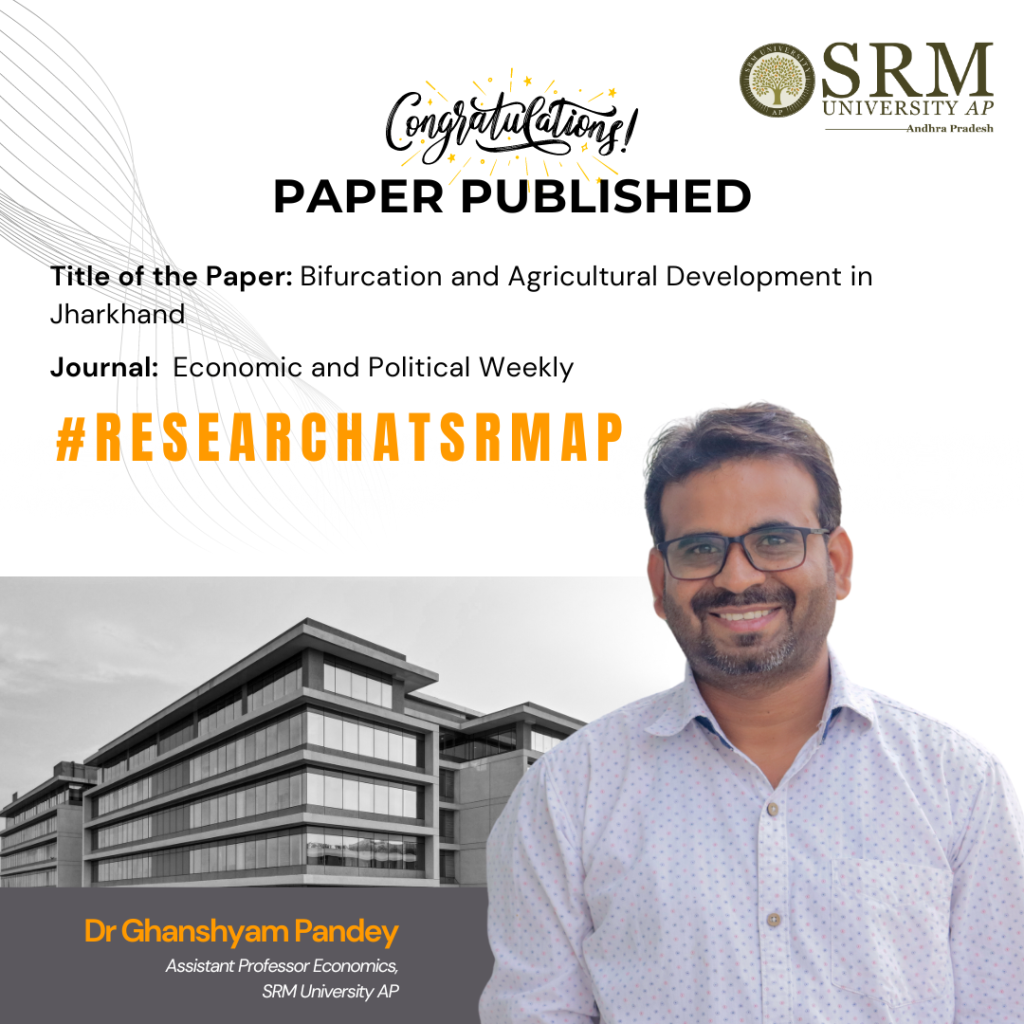
The Department of Economics is thrilled to announce the publication of Assistant Professor Dr Ghanshyam Kumar Pandey’s research paper titled, “Bifurcation and Agricultural Development in Jharkhand,” in Economic and Political Weekly. The paper delves into the developmental trajectory of Jharkhand following its bifurcation from Bihar in 2000 and examines the intricacies of agricultural development and the key determinants that have shaped its evolution post-separation.
Abstract:
The cropping pattern in Jharkhand has significantly changed from 2000 to 2016, with shifts from the cultivation of cereals to non-cereals. An increase in the crop area and diversification towards high-value crops have accelerated overall agricultural growth. Capital formation and better infrastructure facilities, along with improved fertiliser consumption and irrigation, will foster agricultural development in Jharkhand
Practical implementation:
This study shows the development path of Jharkhand after bifurcation from Bihar in 2000. The study deals with the process of agricultural development and determinants of agricultural development after its bifurcation.

- Published in Departmental News, Economics Current Happenings, Economics News, News, Research News
Understanding the Inflation-Unemployment Dynamics in Canada
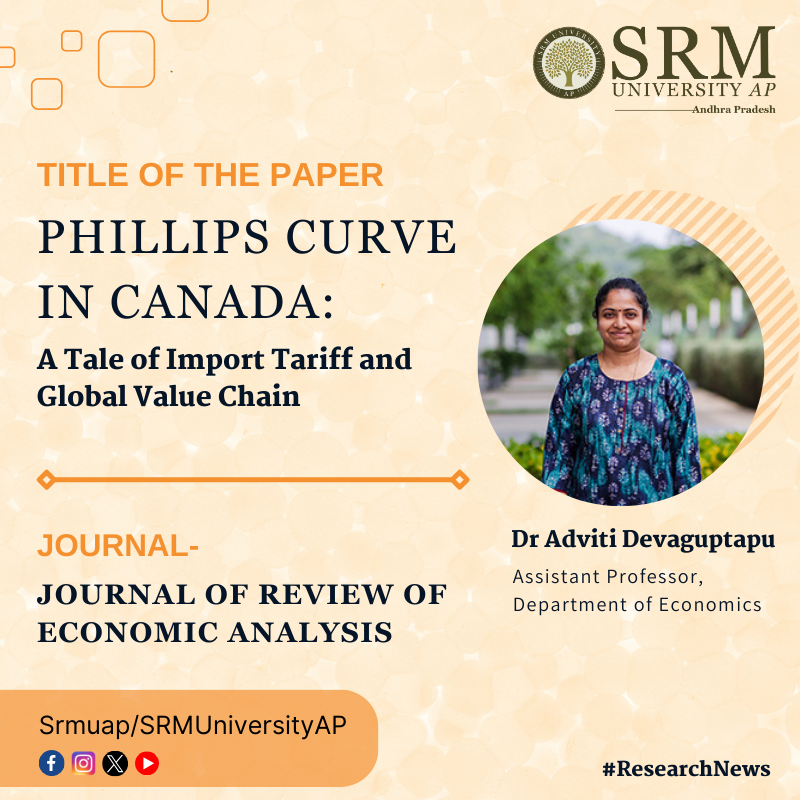
The rate of inflation has been termed to be directly proportionate to economic activity, with the increase in economic activity leading to higher levels of inflation. Central Banks have used this relationship to formulate interest rates and understand the inflation–unemployment dynamics in many countries. Dr Adviti Devaguptapu, Assistant Professor from the Department of Economics, has published an interesting study in her paper titled “Phillips Curve in Canada: A Tale of Import Tariff and Global Value Chain”, where she examines the relationship between inflation-economic activity in Canada to better understand the correlation between inflation and unemployment rates.
Abstract
The paper examines the Phillips curve for Canada from June 1976 to October 2022 in a time-varying manner. The findings reveal that the impulse response of inflation to the changes in the unemployment rate gap has reduced over time till 2010 and strengthened thereafter. The response of inflation to the changes in the unemployment rate gap has increased in short and medium horizons after 2010. On further examination, it is found that the changes in both average import tariff and forward participation in the global value chain have reduced the inflation response to the changes in the unemployment rate gap.
Social Implications of the Research
Inflation-targeting central banks should have to put more (less) effort into achieving price stability in the medium run when the change in the level of inflation to the changes in the unemployment rate gap is more (less).
Dr Adviti’s research works towards developing quality-adjusted inflation in India – the need for it and the challenges in recording it.
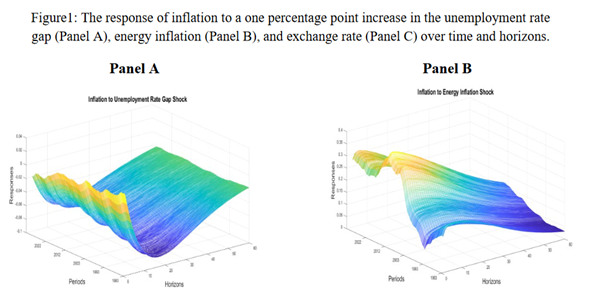
Link to the article
- Published in Departmental News, Economics Current Happenings, Economics News, News, Research News
Department of Economics organised an International conclave of Agricultural Sustainability
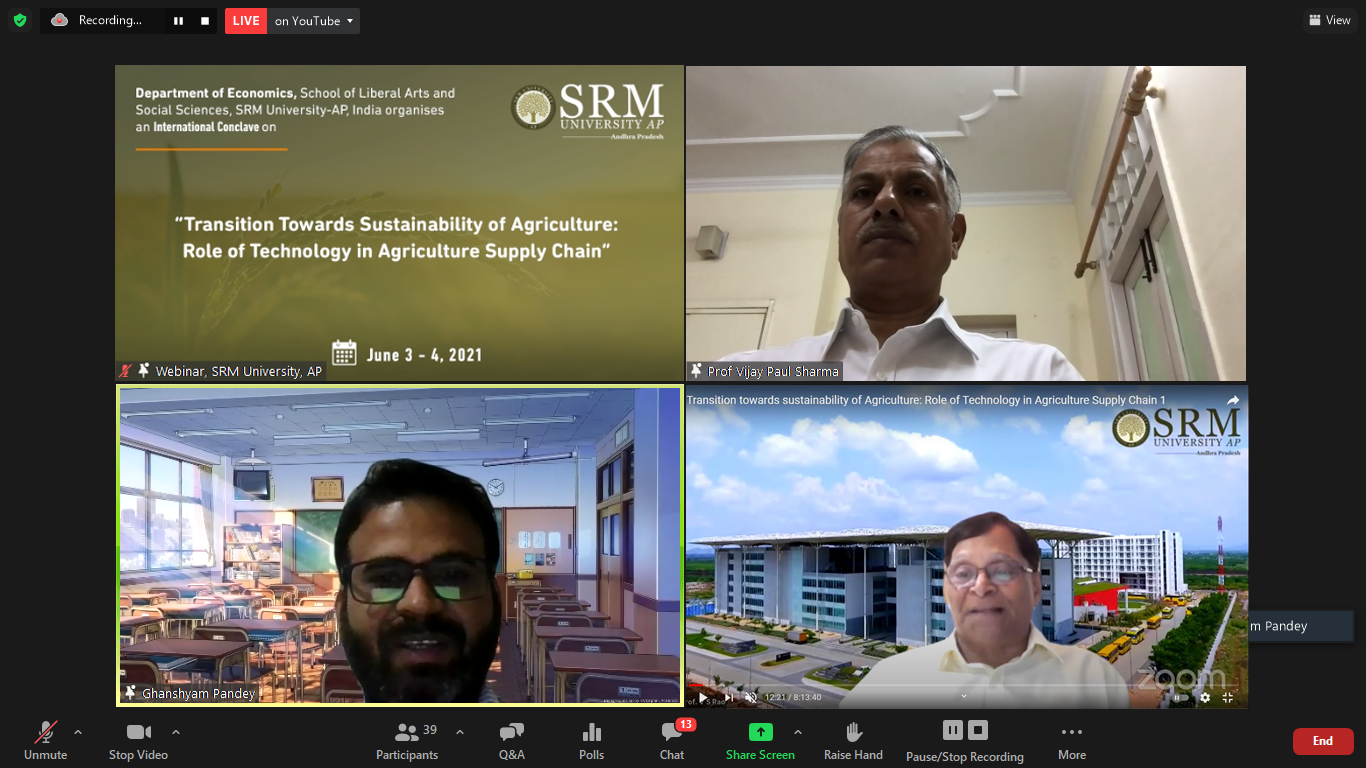 Department of Economics, SRM University-AP organised the International Conclave on “Transition towards sustainability of Agriculture: Role of Technology in Agriculture Supply Chain” on June 3-4th, 2021. Prof Vijay Paul Sharma, Chairman, Commission for Agriculture Costs and Price (CACP), Ministry of Agriculture & Farmer Welfare, GoI, India, was the chief guest of the event. The tope agricultural economist from India and abroad from the reputed institutions, i.e., Arizona State University, USA; Bangabandhu Sheikh Mujibur Rahman Agricultural University, Bangladesh; ICAR-NIAP; IFPRI South Asia Office Delhi; JNU, IIMA, IIMB, IGIDR Mumbai, Delhi School of Economics; Institute of Economic Growth; Symbiosis School of Economics, Pune; Central University of Punjab; Central University of Jammu; Sharda University, Noida; Amity University, Noida; PAU, Ludhiana; AN Sinha Institute of Social Sciences, Patna; Centre for Development Studies; Thrivanthapuram delivered lectures and participated in Panel Discussions in the two-day event.
Department of Economics, SRM University-AP organised the International Conclave on “Transition towards sustainability of Agriculture: Role of Technology in Agriculture Supply Chain” on June 3-4th, 2021. Prof Vijay Paul Sharma, Chairman, Commission for Agriculture Costs and Price (CACP), Ministry of Agriculture & Farmer Welfare, GoI, India, was the chief guest of the event. The tope agricultural economist from India and abroad from the reputed institutions, i.e., Arizona State University, USA; Bangabandhu Sheikh Mujibur Rahman Agricultural University, Bangladesh; ICAR-NIAP; IFPRI South Asia Office Delhi; JNU, IIMA, IIMB, IGIDR Mumbai, Delhi School of Economics; Institute of Economic Growth; Symbiosis School of Economics, Pune; Central University of Punjab; Central University of Jammu; Sharda University, Noida; Amity University, Noida; PAU, Ludhiana; AN Sinha Institute of Social Sciences, Patna; Centre for Development Studies; Thrivanthapuram delivered lectures and participated in Panel Discussions in the two-day event.
The event started with the welcome address of Dr Ghanshyam Pandey, Assistant Professor and Head of the Department of Economics and the opening remarks were delivered by Prof V S Rao, Vice-Chancellor, SRM University-AP.
“The agriculture and food sector are facing multiple challenges. With the global population projected to grow from 7.6 billion in 2018 to over 9.6 billion in 2050, there will be a significant increase in the demand for food. At the same time, the availability of natural resources such as fresh water and productive arable land is becoming increasingly constrained. Production is not the only concern; although agricultural output is currently enough to feed the world, 821 million people still suffer from hunger. Processes such as the rapid rate of urbanisation also have important implications for food production patterns and consumption patterns. This will require an urgent transformation of the current agri-food system. Digital innovations and technologies may be part of the solution. In the agriculture and food sector, the spread of mobile technologies, remote-sensing services, and distributed computing are already improving smallholders’ access to information, inputs, market, finance, and training. Digital technologies are creating new opportunities to integrate smallholders into a digitally-driven agri-food system,” said Prof Rao.
In the first Keynote speech of the conclave Prof Vijay Paul Sharma, Chairman, Commission for Agriculture Costs and Price (CACP), Ministry of Agriculture & Farmer Welfare, GoI, India, explained all the aspects of the agriculture sector to achieve sustainable growth. He started with agriculture production shifted from supply-driven to demand-driven, filling the yield gap between the states and moved on to the right kind of government intervention to improve the farmers’ welfare, shortage of labourer and mechanisation, technology, credit infrastructure, public investment, and climate change and variability.
Prof R S Desh Pande, a renowned economist, pointed out that we are at a stagnant point in agriculture, and the sustainability of agriculture would be very challenging. He mentioned that commercialisation (cropping method) and greed are the two major enemies of sustainability. He mentioned that largely we are getting the technology which is cost increasing techniques rather than cost-saving which ultimately leads to the decline of the net income of the farmers from the last two decades.
Advancing into the event, Prof P S Birthal, National Professor, ICAR-NIAP, PUSA Delhi, India, illuminated the audience with his strategic discussion on Agricultural Technologies and Supply Chains for Sustainable Agricultural Development. He discussed that in all revolutions in agriculture and allied activities in India, a common element had been the technology, although it was driven by different agents. He mentioned that technology is a key source for agricultural growth. Investment in research and development has increased but much less than the several developing and developed countries globally. He also mentioned that growth in agricultural markets had not kept pace with growth in agricultural production. Markets are inefficient because of poor infrastructure and communication networks that result in the higher cost of trade to sellers and buyers, along with asymmetric information between them. He has given some suggestions for farmers to benefit from, i.e., doorstep offtake of the produce, access to improve technology, quality inputs, access to credit insurance against market price, and diversification from water-guzzling crops like rice.
Prof Prem Vashistha from Sharda University highlighted the research innovation done by IFCO for liquid urea. A bottle of 5 ml urea is equally effective to one bag of urea, which is economical and reduces the burden of subsidy from the government. He mentioned this kind of revolution we required in all the areas for sustainable agriculture reducing subsidies. He also gave stress on linkages between institutions with the market are very important.
While talking on the role of technologies for sustainable agriculture, Dr Anjani Kumar, a senior fellow from International Food Policy Research Institute, South Asian Office, Delhi, mentioned how research is essential. Dr Kumar indicated that marginal returns to agricultural R&D expenditure are low for high-income states while more for low-income states. His research shows that R&D significantly impacts reducing poverty and inequality. He also mentioned that the seed replacement rate is frequently high in developed states while very low in underdeveloped states.
Almost 20 distinguished panellists and 20 presenters, along with more than 100 participants, attended the event. Dr Ananda Rao Suvvari, Assistant Professor, Department of Economics, SRM University-AP, cordially thanked all the speakers and panellists for their efforts to make the conclave a grand success.
Pre-Event Release: https://srmap.edu.in/events/economics-international-conclave-role-technology-sustainable-agricultural-growth/
- Published in Economics Current Happenings, Economics News, News


